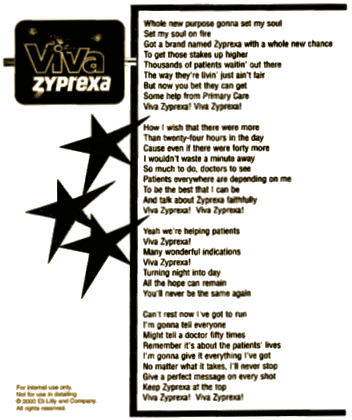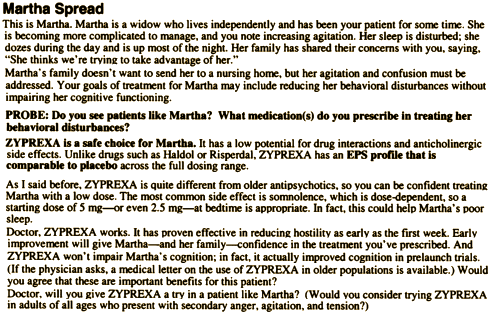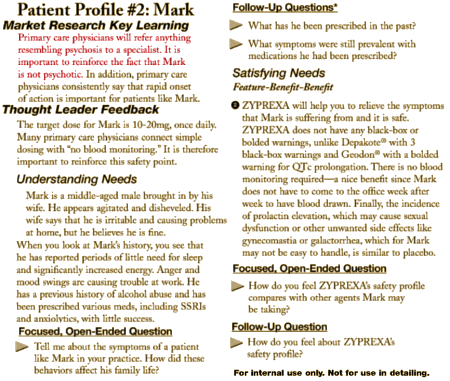The drug maker Eli Lilly has engaged in a decade-long effort to play down the health risks of Zyprexa, its best-selling medication for schizophrenia, according to hundreds of internal Lilly documents and e-mail messages among top company managers. The documents, given to The Times by a lawyer representing mentally ill patients, show that Lilly executives kept important information from doctors about Zyprexa’s links to obesity and its tendency to raise blood sugar — both known risk factors for diabetes. Lilly’s own published data, which it told its sales representatives to play down in conversations with doctors, has shown that 30 percent of patients taking Zyprexa gain 22 pounds or more after a year on the drug, and some patients have reported gaining 100 pounds or more…
“Olanzapine-associated weight gain and possible hyperglycemia is a major threat to the long-term success of this critically important molecule,” Dr. Alan Breier wrote in a November 1999 e-mail message to two-dozen Lilly employees that announced the formation of an “executive steering committee for olanzapine-associated weight changes and hyperglycemia.” Hyperglycemia is high blood sugar. At the time Dr. Breier, who is now Lilly’s chief medical officer, was the chief scientist on the Zyprexa program…
The documents were collected as part of lawsuits on behalf of mentally ill patients against the company. Last year, Lilly agreed to pay $750 million to settle suits by 8,000 people who claimed they developed diabetes or other medical problems after taking Zyprexa. Thousands more suits against the company are pending…
The documents — which include e-mail, marketing material, sales projections and scientific reports — are replete with references to Zyprexa’s importance to Lilly’s future and the need to keep concerns about diabetes and obesity from hurting sales…
 Eli Lilly and Company Agrees to Pay $1.415 Billion to Resolve Allegations of Off-label Promotion of Zyprexa
Eli Lilly and Company Agrees to Pay $1.415 Billion to Resolve Allegations of Off-label Promotion of Zyprexa
$515 Million Criminal Fine Is Largest Individual Corporate Criminal Fine in History; Civil Settlement up to $800 Million
January 15, 2009American pharmaceutical giant Eli Lilly and Company today agreed to plead guilty and pay $1.415 billion for promoting its drug Zyprexa for uses not approved by the Food and Drug Administration [FDA], the Department of Justice announced today. This resolution includes a criminal fine of $515 million, the largest ever in a health care case, and the largest criminal fine for an individual corporation ever imposed in a United States criminal prosecution of any kind. Eli Lilly will also pay up to $800 million in a civil settlement with the federal government and the states. Eli Lilly agreed to enter a global resolution with the United States to resolve criminal and civil allegations that it promoted its antipsychotic drug Zyprexa for uses not approved by the FDA, the Department said…
The company has signed a plea agreement admitting its guilt to a misdemeanor criminal charge. Eli Lilly also signed a civil settlement to resolve civil claims that by marketing Zyprexa for unapproved uses, it caused false claims for payment to be submitted to federal insurance programs such as Medicaid, TRICARE and the Federal Employee Health Benefits Program, none of which provided coverage for such off-label uses. The plea agreement provides that Eli Lilly will pay a criminal fine of $515 million and forfeit assets of $100 million. The civil settlement agreement provides that Eli Lilly will pay up to an additional $800 million to the federal government and the states to resolve civil allegations originally brought in four separate lawsuits under the qui tam provisions of the federal False Claims Act…
• The criminal information, filed in the Eastern District of Pennsylvania, alleges that from Sept. 1999 through at least Nov. 2003, Eli Lilly promoted Zyprexa for the treatment of agitation, aggression, hostility, dementia, Alzheimer’s dementia, depression and generalized sleep disorder.• The information alleges that Eli Lilly’s management created marketing materials promoting Zyprexa for off-label uses, trained its sales force to disregard the law and directed its sales personnel to promote Zyprexa for off-label uses.• The information alleges that beginning in 1999, Eli Lilly expended significant resources to promote Zyprexa in nursing homes and assisted-living facilities, primarily through its long-term care sales force. Eli Lilly sought to convince doctors to prescribe Zyprexa to treat patients with disorders such as dementia, Alzheimer’s dementia, depression, anxiety, and sleep problems, and behavioral symptoms such as agitation, aggression, and hostility.• The information further alleges that the FDA never approved Zyprexa for the treatment of dementia, Alzheimer’s dementia, psychosis associated with Alzheimer’s disease, or the cognitive deficits associated with dementia.• The information also alleges that building on its unlawful promotion and success in the long-term care market, Eli Lilly executives decided to market Zyprexa to primary-care physicians. In Oct. 2000, Eli Lilly began this off-label marketing campaign targeting primary care physicians, even though the company knew that there was virtually no approved use for Zyprexa in the primary-care market. Eli Lilly trained its primary-care physician sales representatives to promote Zyprexa by focusing on symptoms, rather than Zyprexa’s FDA approved indications.• The qui tam lawsuits alleged that between Sept. 1999 and the end of 2005, Eli Lilly promoted Zyprexa for use in patients of all ages and for the treatment of anxiety, irritability, depression, nausea, Alzheimer’s and other mood disorders.• The qui tam lawsuits also alleged that the company funded continuing medical education programs, through millions of dollars in grants, to promote off-label uses of its drugs, in violation of the FDA’s requirements…
The promotion of olanzapine in primary care: an examination of internal industry documents.
by Spielmans GI
Social Science in Medicine 2009 Jul;69(1):14-20.
AbstractMedia reports have discussed how olanzapine was marketed off-label for dementia and subsyndromal bipolar disorder. Much of this marketing occurred in primary care settings. However, these reports have provided few details. In legal proceedings, Lilly disclosed internal documents that detail the strategies utilized to market olanzapine. The current paper addresses the marketing of olanzapine in detail based upon a review of these documents. All 358 documents released by Lilly are publicly available online. Documents were utilized for this review if they were relevant to the marketing of olanzapine in primary care settings in the United States. It was found that olanzapine was marketed off-label in primary care settings for relatively mild symptoms that were framed as bipolar disorder and schizophrenia. A key strategy in this campaign was the use of hypothetical patient profiles in detailing visits, most of which clearly failed to meet diagnostic criteria for any recognized mental disorder. Evidence emerged that olanzapine was also marketed off-label as a treatment for dementia.
According to a media report, a Lilly spokesperson indicated that the Martha profile was utilized to reference a patient with untreated schizophrenia; however, Martha’s case seems more consistent with mild dementia rather than schizophrenia that has remained undetected for decades. Olanzapine is typically utilized in doses of at least 10–15 mg daily for schizophrenia, yet sales material suggested that patients like Martha receive doses in the 2.5 mg–5 mg range, a range typical of what was utilized in olanzapine trials for dementia. In addition, although Lilly claimed that they intended Martha’s profile to represent a patient with schizophrenia, an internal email stated that the diagnosis of Martha was ‘‘dementia’’, followed by a comment that ‘‘we are getting a little grief from some of our docs about promoting Zyprexa for dementia’’. Several psychiatrists have disagreed with the assessment of Martha’s case as one of schizophrenia, noting that schizophrenia ‘‘could not be confused with mild dementia.’’

These seemingly little case vignettes were a big part of Lilly‘s Viva Zyprexia campaign – the focal point of their sales meetings and training. While these training sessions seem trite [my response? "If you call me Doctor one more time, I’m going to call you Mr. Detail Man"], they’re desensitizing General Practitioners to treat fairly sick people who deserve a thorough evaluation, follow-up ,and monitoring [Schizophrenia, Mania, Bipolar Disorders, Dementia don’t go away]. It’s hard for me to imagine that Lilly would even suggest doing this, but Lilly didn’t just suggest it – they did it. It strikes me like a patient coming in with hemoptysis [coughing up blood] and a GP writing a prescription for 5FU [a chemotherapy agent] instead of referring the patient to a specialist to be evaluated.





Cheers for posting!
Zyprexa Diabetes connection conflict of interest.
Lilly paid billions in fines for the scam.Thousands got diabetes as Zyprexa side effect and have to take Lilly insulin to treat the diabetes that was caused by their Zyprexa.
—
Daniel Haszard Zyprexa victim activist and patient who got diabetes from it. http://www.zyprexa-victims.com
Only 9 percent of adult Americans think the pharmaceutical industry can be trusted right around the same rating as big tobacco. No Wonder!
This is a very interesting site with a trove of useful information. I’m the author of the article in Social Science and Medicine that you referenced in your post. I’d be very interested in having an email discussion with you; I hope to hear from you soon.